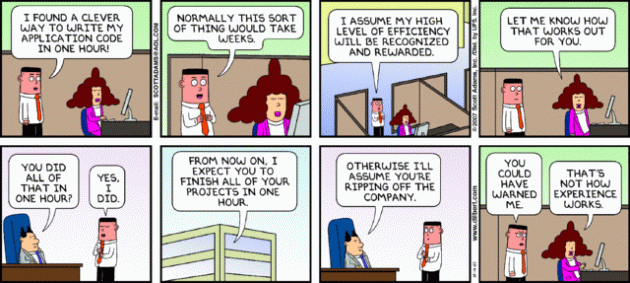I always thought that employers are afraid of remote working, because their full time employees would work less. There’s no trust in self-organization and the fact that we cannot see what they are doing form 9 to 5. (What if they are sleeping or doing laundry?! A nightmare!)
There is that of course, but more than that, employers are afraid that employees won’t work more. Companies are afraid that if we don’t have to work from 9 to 5, we will have more incentive to be efficient and achieve the same result in less hours. Because then we can spend remaining hours doing something else.
What happens if you do your work in less time while in the office? Leave early? Not really, because that would mean you “don’t have enough work”. If you do your work too fast, you’ll get more work, because you show your potential of being able to do it. Of course, there are people who enjoy doing what they do and would love to work more. But wouldn’t they enjoy more work regardless of where they are? Most likely, even in the home office they will make sure to be visible for their results and be awarded with more work.
And then there are others, who would enjoy having some free time to pursue other life goals and finally achieve a bit balance in this work/life challenge. They don’t want to escape recognition for actual results, but not necessarily want to fill all their remaining free time with more work either. Maybe they can take on more work and still finish earlier, then don’t they deserve the hours they saved?
So while employers dont want to give people freedom to work less hours than they could, what they achieve is people not having motivation to fully use their potential.
You might think I am talking about lazy low performers. “This is not the kind of people we need!” you would say. Maybe not, but face this – people more than ever want to make sure they don’t miss out on life outside of work. They want to try different things, learn new skills, travel the world, spend more time with loved ones. A lot of them happen to be also very talented at what they do. They just don’t want to work for the sake of more work. More interesting work, maybe. In the organizations however, following multiple restructurings, employees are already doing the job of two (at least). As we know, to get promoted we ask them to take on additional responsibilities to see if they can cope. The raise? The raise will come with the promotion. Soon, they say. Employees are overworked and under-trusting. It’s time to re-think the way we treat them or we risk losing the most innovative, passionate, curious and efficient employees.
How does organization need to change to adjust*?
– Award for results and not time spent in office. Make your office a hub, not a day-time prison. Give employees freedom to have flexible hours, be able to work remotely, as long as they keep up the results.
– Set realistic goals. The worst you can do it throw at employees more than they can handle in hope that they’ll do most of it. You think you’re ‘challenging’ them, when in fact you exhaust them of work that is never done and no free time to live. Give them incentive – if they do work faster, they can enjoy their free time.
– Rethink your promotion techniques. Keep your promises, if you want to throw more work at someone ‘to test’ – make sure it is time bound, agreed and followed upon.
– Redefine High-Potentials and High-Performers in your company. Not only people who spend nights at the office deserve promotions. In fact, while you’ll get more done on short-term by promoting overworked people, it’ll be a wrong message and a culture to promote.
It’s a culture change, but if you want to succeed – it’s time to be relevant for the new generation of work force. Besides, wouldn’t you want to spend more time on life outside of work?
*Yes, adjust. This is no time for rebelling and enforcing policies or you’ll lose your best people.
